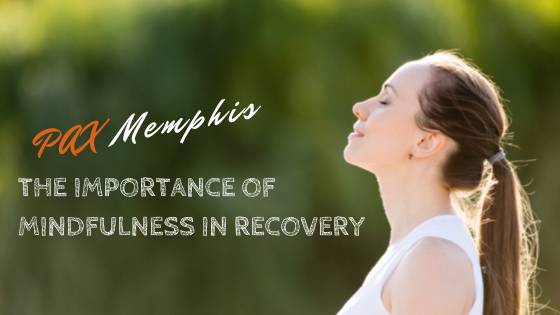Many individuals struggling with addiction often focus solely on the substance they are addicted to. Instead, people should put more focus on mindfulness in recovery. These individuals typically find it difficult to concentrate on anything other than the substance they are addicted to and spend significant amounts of time, energy, and resources until their craving is satisfied.
Triggers and cravings are major obstacles for individuals who enter drug and alcohol rehabilitation programs. The mental chaos and erratic emotional dysfunction that follows addiction ultimately cause many recovering addicts to relapse, especially in early recovery. One of the best tools to help recovering addicts adopt new healthy coping skills and adjust to a sober life is mindfulness.
What is Mindfulness?
Mindfulness is the basic psychological process of being present in the here and now. More importantly, this mindset requires compassion and an absence of judgment regarding the past or future. Mindfulness cultivates an increased perception of self and gratitude for the present moment. This practice is an essential tool in teaching recovering addicts to learn how to deal with cravings by becoming aware of triggers. Mindfulness also helps the addict accept their feelings without giving in to the unhealthy coping mechanism of using other substances to avoid their emotions.
Mindfulness teaches individuals the skill of learning how to stay present in the moment, become increasingly aware, and observe feelings without judgment. The process of staying in the moment requires recovering addicts to stop stressing about the past or worrying about the future. Mindfulness also allows individuals to learn how to notice feelings without impulsively acting out on them. Once a recovering individual begins to accept their feelings, without judgment, he/she will be able to allow these feelings to come and go without turning to drugs or alcohol to avoid them.
Benefits of Mindfulness in Recovery
Research shows that mindfulness-based therapies in recovery help improve symptoms of depression, anxiety, and stress. Mindfulness also improves the overall quality of life from physical functioning to enhancing the health of individuals. Studies indicate that mindfulness also increases the activity of regions in the brain that control self-regulation. Ultimately, practicing mindfulness in recovery is an effective form of therapy used to combat the impulsive and irrational behaviors of individuals struggling with addiction.
Here are some other benefits of mindfulness in sobriety.
- Coping with stress – Mindfulness teaches recovering addicts in recovery a healthy way to cope with stress. Practicing mindfulness allows individuals to focus on the present moment and not the past nor the future, therefore, reducing stress.
- Treating mental health conditions – Mindfulness encourages individuals struggling with mental health disorders to break the cycle of negative thoughts and treat anxiety, depression, and substance use disorder.
- Addressing feelings – Individuals in recovery who practice mindfulness become more aware of their feelings and thoughts, which ultimately improves their decision-making abilities and overall wellbeing.
- Mitigating cravings and relapse triggers– Mindfulness allows recovering addicts to deal with triggers and cravings without impulsively acting out on them.
Practicing Mindfulness in Recovery
One of the greatest benefits of mindfulness is the ability of an individual to practice this technique at any time and in any place. There is no right or wrong way to practice mindfulness. Practicing mindfulness in recovery helps individuals respond rather than simply react to his/her emotions. Here are a few ways to practice mindfulness in recovery.
- Be present – When an individual feels stressed about something in the past or anxious over a situation that may happen in the future, this may lead to negative thinking and impulsive behaviors, triggering a relapse. Instead, mindfulness increases awareness and focuses on the importance of the present moment. Try identifying your senses, your surroundings, and the ground upon which you stand. These grounding techniques will help you stay present in the moment.
- Focus on your breathing – Conflict within personal relationships, work responsibilities, and even sudden calamity can lead to extreme stress. When unexpected stress and overwhelming emotions arise, focusing on your breath can draw attention to an internal thing that you can control – your breathing. Mindfulness teaches individuals to use their body’s natural response to manage stress.
- Allow your thoughts to come and pass – Most recovering addicts struggle with intrusive and obsessive thoughts. Learning how to allow your thoughts to come and pass is a great mindfulness practice. This technique teaches individuals to become aware of their thoughts without having to respond impulsively. This isn’t easy to do, but it comes with practicing mindful meditation.
- Be still – As a society, many people associate consistently being busy with success. For many recovering addicts, the chaos of always being on the go is an unhealthy comfort. Taking the time to sit quietly, reflect, and maintain the stillness is the best way for recovering addicts to connect with feelings while quieting the noise of outside stressors. Take time during the day to be still and take in the present moment – this will help quiet your mind.
Mindfulness in Addiction Therapy
An integral component of holistic addiction treatment is mindfulness in a group therapy setting. During group therapy sessions, each recovering individual gets the opportunity to talk about his/her addiction issues while other members of the group are able to identify and relate. Mindfulness-based addiction therapy is an integrative approach to addressing individuals struggling with substance abuse disorder.
At PAX Memphis, we believe that each client has unique needs that must be met with an individualized and integrative approach to treating addiction. Mindfulness therapy is a vital component to addiction recovery. If you or your loved one is struggling with addiction, call us today!
Medically Reviewed: September 25, 2019

All of the information on this page has been reviewed and verified by a certified addiction professional.










